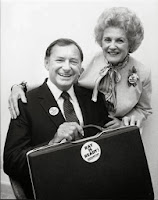A couple of weeks ago Christian Lopez and I traveled down to Sumter County to record oral histories with local community members for the First Person Project. This trip grew from a collaboration with the UGA Archway Partnership, a program designed to expand the reach of the university and help address economic develop needs and community priorities by implanting UGA "Archway Professionals" in locations around the state.
We worked with Sumter County Archway Professional Maggie Potter and Americus Downtown Development Director Angie Singletary on this trip. From our perspective, we were thrilled to be able to record oral histories from south Georgia--an area that we'd love to have better represented in our collections. At the same time, we were able to share our resources with the folks down in Sumter County. We are providing the Archway Partnership and the Americus Development Authority with copies of the recordings that they can re-purpose for tourism and promotion down the line.
All in all, it was a very successful collecting trip. We recorded eight excellent interviews with citizens from across Sumter County. We also made a pilgrimage to one of the "holy sites" of Georgia politics--checking in at the Jimmy Carter National Historic Site in Plains and visiting the Carter Boyhood Farm nearby. And not only did we get to spend the night in the beautifully renovated Windsor Hotel in downtown Americus, but during the day we were lucky enough to be allowed to film in the Lee Council House, an amazing historic property owned by the Sumter Historic Trust that we were told was built as a wedding gift for the bride of a local businessman.
We'll be adding all eight of the oral histories from this trip to the First Person Project finding aid soon, but in the meantime, here are a couple of excerpts from our interviews with Willie Green Cutts and Charles Crisp.
Post by Callie Holmes, Oral History and Media Archivist, Russell Library
All in all, it was a very successful collecting trip. We recorded eight excellent interviews with citizens from across Sumter County. We also made a pilgrimage to one of the "holy sites" of Georgia politics--checking in at the Jimmy Carter National Historic Site in Plains and visiting the Carter Boyhood Farm nearby. And not only did we get to spend the night in the beautifully renovated Windsor Hotel in downtown Americus, but during the day we were lucky enough to be allowed to film in the Lee Council House, an amazing historic property owned by the Sumter Historic Trust that we were told was built as a wedding gift for the bride of a local businessman.
Post by Callie Holmes, Oral History and Media Archivist, Russell Library










